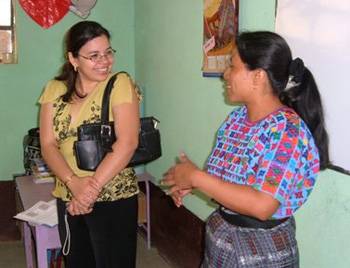South Africa invites faculty member to consult on education study
By Philip Hadley
University News Service
December 20, 2007
 Alejandra Sorto (left) talks with a teacher in Central America. |
During Dec. 2006-March 2007, Sorto and a team of educational researchers from
“I measured how knowledgeable the teachers were in the level of math they taught and the quality of their teaching methods,” Sorto said. “
The results of the study, which focused on private and public schools in both countries, found that elementary teachers in
“The middle school teachers are doing a good job in terms of comprehending the content, but have difficulty communicating that knowledge to the students,” Sorto said. “They know math but they don’t grasp the concept of how to teach it to this age group.”
Little educational research had been conducted in these countries before Sorto’s study. Sorto said taking part in this groundbreaking research was thrilling for her.
“The experience for a researcher to go to a place where no one has gone before is amazing,” Sorto said as her eyes lit up. “It’s like being an anthropologist finding a bone for the first time in a place that nobody looked or thought about. It is extremely powerful to be a part of changing an entire country’s educational system.”
Sorto said it is important for researchers and governments not to forget about the education systems in undeveloped countries. Many lack the most basic of needs, which includes funding.
“The governments of these countries need to invest more money in education,” Sorto said as she pointed to a picture of a dilapidated schoolhouse. “The conditions the students and teachers work in are insufficient. To be able to have equality you also have to invest in your teachers and the preparation of those teachers. After the basic principles are achieved then they can move to the next level and figure out ways to improve.”
In the past Sorto has aided
“I am consulting with
The results for Sorto’s study in Central America will be presented by her and her team at Columbia University in New York at the Comparative and International Education Society’s 52 Annual Conference on March 17-21. The results will also be presented at the International Commission on Mathematical Instruction Study in